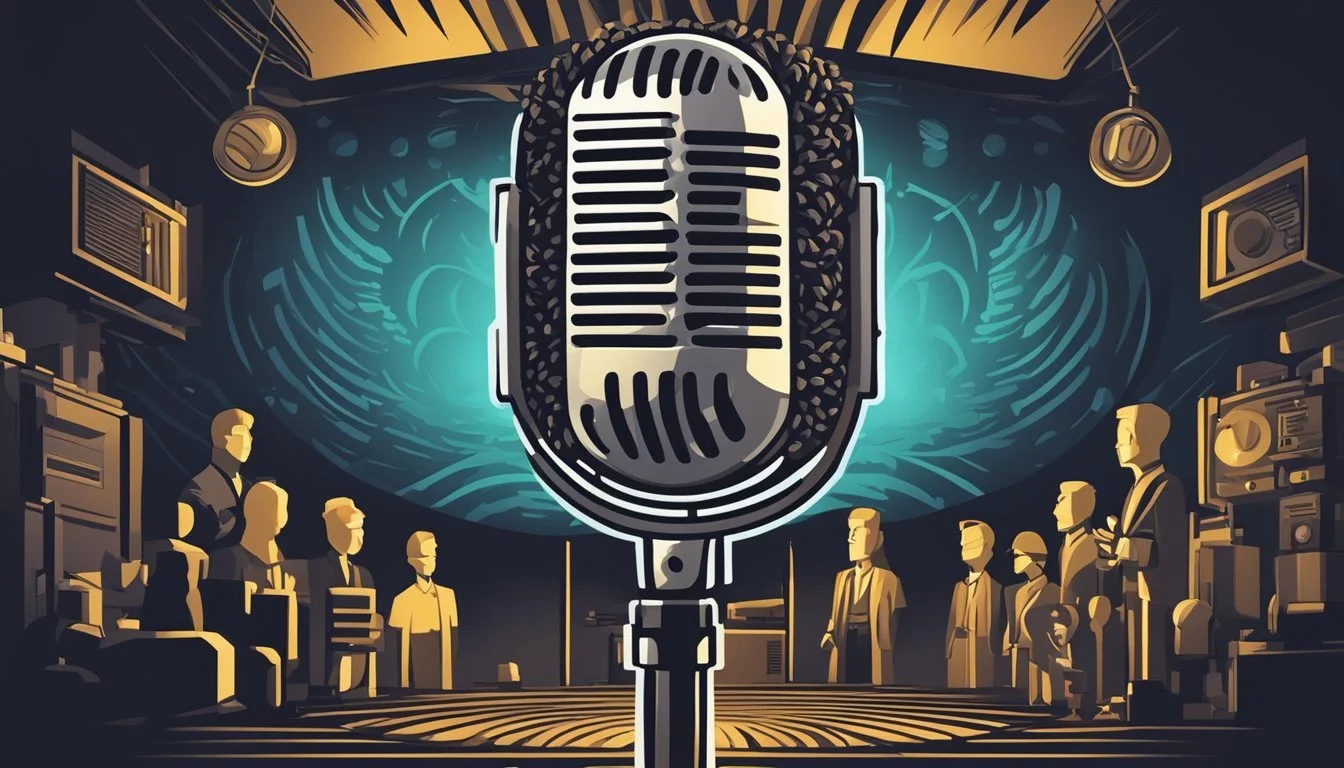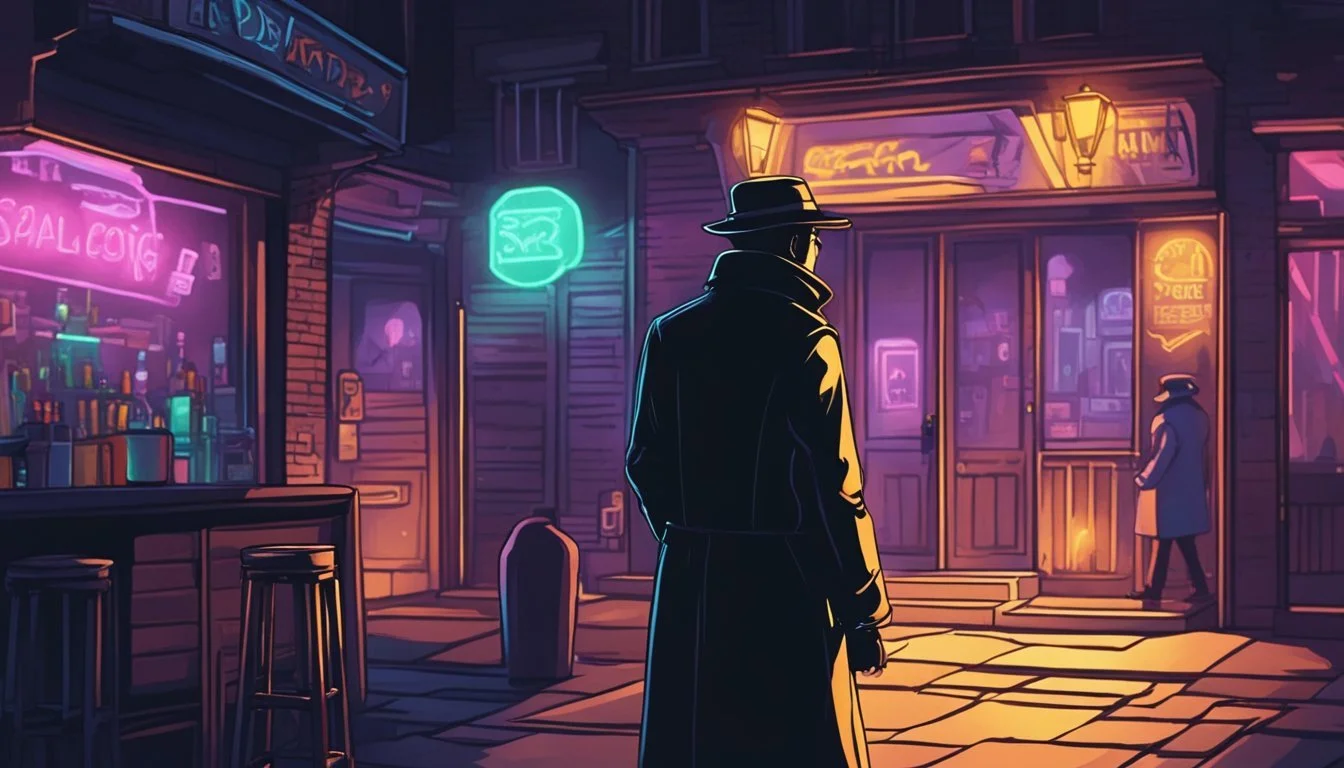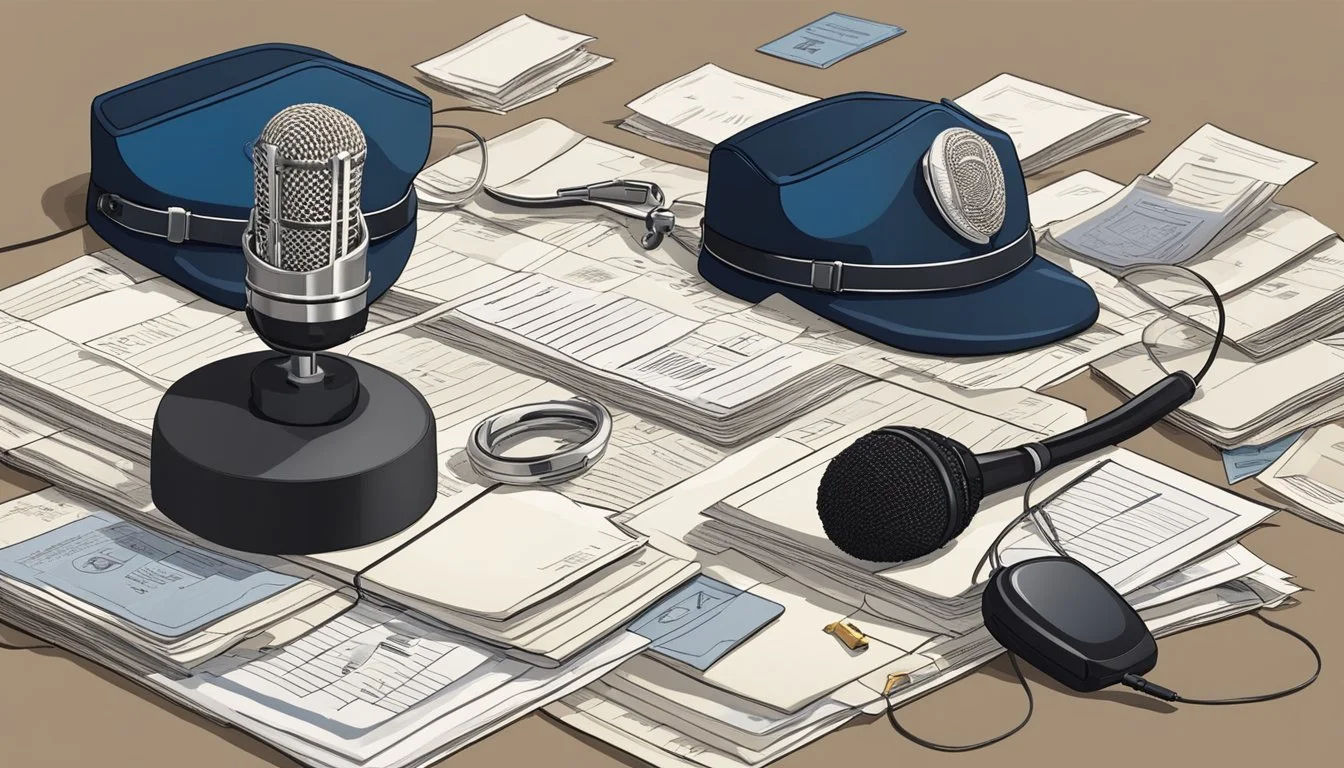The Underworld Podcast: Organized Crime Audio Goes Legit on Screen
From Earbuds to Primetime
The Underworld Podcast takes listeners on a gripping journey into the shadowy realms of organized crime. Hosted by investigative reporters Danny Gold and Sean Williams, this audio series uncovers the intricate networks of criminal enterprises that operate across the globe. From Balkan warlords to Brooklyn wiseguys, the podcast exposes barely-visible criminal structures that impact everyday lives.
Gold and Williams bring their extensive experience tracking dangerous individuals to shed light on how gangs rise to power and sometimes fall from grace. The podcast delves into the inner workings of transnational criminal networks, exploring topics like bank heists, drug smuggling operations, and elaborate scams.
The Underworld Podcast's transition to screen marks a new chapter in its exploration of criminal underworlds. This move allows the hosts to present their meticulously researched content in a visual format, potentially reaching wider audiences. The adaptation demonstrates the growing appetite for true crime content across different media platforms.
The Transformation of Organized Crime in Media
Organized crime's portrayal in media has undergone a dramatic shift over the decades. From shadowy figures to complex anti-heroes, crime lords and their networks have captured the public imagination in new ways.
From Taboo to Mainstream: The Evolution
Early depictions of organized crime focused on sensationalism and moral warnings. Films like "The Public Enemy" (1931) portrayed gangsters as dangerous threats to society. As censorship relaxed, more nuanced portrayals emerged.
"The Godfather" (1972) marked a turning point, humanizing crime families and exploring their internal dynamics. This paved the way for TV shows like "The Sopranos," which delved into the psychological complexities of mob life.
Today, podcasts like "The Underworld" examine real-world criminal networks with journalistic rigor. They shed light on the global reach and economic impact of modern organized crime.
The Intricacies of Portraying Gang Life
Media depictions of gangs have evolved from simplistic stereotypes to more authentic representations. Shows like "The Wire" highlighted the systemic issues that fuel gang activity.
Documentaries and podcasts now explore the hierarchies, codes, and economies of criminal organizations. They reveal the complex web of relationships between gangs, law enforcement, and communities.
This shift has led to a more informed public discourse about the root causes of organized crime. It has also raised questions about the ethics of humanizing dangerous individuals and groups.
Crime Lords in Pop Culture
Crime bosses have become iconic figures in popular culture. Characters like Tony Soprano and Walter White have achieved anti-hero status, captivating audiences with their charisma and complexity.
Real-life crime lords like Pablo Escobar have inspired numerous books, films, and TV series. These works often blur the line between fact and fiction, mythologizing the lives of notorious figures.
Podcasts such as "The Underworld" aim to separate myth from reality. They examine the true impact of crime lords on global politics and economics, offering a more grounded perspective on these influential figures.
Spotlight on 'The Underworld Podcast': A Case Study
The Underworld Podcast offers a unique glimpse into organized crime networks worldwide. This groundbreaking show combines investigative journalism with engaging storytelling to expose hidden criminal enterprises.
Founding Stories: Danny Gold and Sean Williams
Danny Gold and Sean Williams, two experienced journalists, created The Underworld Podcast. Their backgrounds in reporting on dangerous individuals and organizations provided a solid foundation for the show.
Gold and Williams leveraged their expertise to craft compelling narratives about criminal networks. Their approach blends rigorous research with a touch of humor, making complex topics accessible to a wide audience.
The duo's commitment to uncovering the truth behind organized crime has set their podcast apart in a crowded field. Their journalistic integrity and fearless reporting have earned them respect among listeners and fellow reporters alike.
Content and Themes: What Makes It Tick
The Underworld Podcast covers a wide range of topics within organized crime. Episodes explore:
Balkan warlords
Brooklyn wiseguys
International drug smuggling operations
Financial scams and bank heists
Each episode delves into the inner workings of criminal networks, revealing their impact on everyday life. The show's strength lies in its ability to connect global criminal activities to local consequences.
Gold and Williams employ a mix of interviews, archival footage, and expert analysis to create immersive audio experiences. This multi-layered approach helps listeners understand the complex web of relationships within criminal organizations.
Impact and Reception: Audience and Critics
The Underworld Podcast has garnered a dedicated following since its launch. Listeners appreciate the show's:
In-depth research
Engaging storytelling
Balanced perspective on sensitive topics
Critics have praised the podcast for its journalistic rigor and ability to make complex subjects accessible. The show's impact extends beyond entertainment, often sparking discussions about law enforcement and policy reform.
Many episodes have gone viral, leading to increased public awareness of lesser-known criminal enterprises. The podcast's success has also opened doors for Gold and Williams, resulting in speaking engagements and collaborations with other media outlets.
Exploring Global Crime Networks
The Underworld Podcast delves into complex criminal networks spanning continents. These shadowy organizations exploit technological advancements and geopolitical vulnerabilities to pursue illicit activities on a global scale.
The Dark Web and Cybercrime
Cybercriminals operate in the hidden recesses of the Dark Web, conducting illegal transactions and coordinating attacks. Cryptocurrency facilitates anonymous financial exchanges, enabling money laundering and the purchase of contraband.
Counterfeit pills laced with fentanyl are sold through encrypted marketplaces, contributing to the opioid crisis. Sophisticated hacking groups target businesses and governments, stealing sensitive data and disrupting critical infrastructure.
Law enforcement agencies face challenges in tracking and prosecuting cybercriminals due to jurisdictional limitations and the rapidly evolving nature of digital crime.
Transnational Operations and Politics
Criminal networks exploit porous borders and weak governance to expand their reach. Drug cartels form alliances with terrorist groups, blurring the lines between organized crime and political violence.
Corrupt officials facilitate trafficking operations, undermining law enforcement efforts. Money laundering schemes involve legitimate businesses, making it difficult to trace illicit funds.
Human rights abuses often accompany transnational criminal activities, with vulnerable populations exploited for labor or sex trafficking. International cooperation is crucial for combating these far-reaching networks.
Warlords and Private Security Firms
In conflict zones, warlords control territories through violence and intimidation. They profit from natural resources and engage in arms trafficking, perpetuating instability.
Private security firms sometimes operate in legal gray areas, providing services to both legitimate clients and criminal organizations. Their activities can complicate peacekeeping efforts and blur the lines of accountability.
Some firms have been implicated in human rights violations, operating with limited oversight in volatile regions. The complex relationship between warlords, private security, and state actors presents ongoing challenges for global security efforts.
The Realities of Crime and Punishment
The criminal underworld operates within complex systems of justice, incarceration, and societal power structures. These forces shape the experiences of those involved in organized crime and impact efforts to combat illegal activities.
Life Inside Prisons
Prisons housing organized crime figures present unique challenges. High-profile inmates may receive special treatment or continue running operations from behind bars. The 'Ndrangheta, Italy's powerful Calabrian mafia, maintains strong networks even in maximum security facilities.
In Brazil, the First Command of the Capital (PCC) emerged from São Paulo's prison system to become a major criminal organization. The PCC leverages its prison roots to recruit members and coordinate activities across correctional facilities.
Overcrowding and poor conditions are common in many prisons globally. This environment can foster further criminal connections and harden inmates rather than rehabilitate them.
Judicial Systems Versus Organized Crime
Prosecuting organized crime cases often proves difficult due to intimidation of witnesses, corruption of officials, and complex international networks. Specialized anti-mafia courts in Italy have achieved some success in convicting high-level bosses.
However, criminal groups adapt quickly to new laws and enforcement tactics. They exploit legal loopholes and jurisdictional differences between countries.
Many justice systems struggle with case backlogs and limited resources when facing well-funded criminal enterprises. This can lead to plea bargains or reduced sentences that benefit crime bosses.
Legitimacy and Corruption: A Thin Line
Organized crime groups often blur the lines between illegal activities and legitimate businesses or political influence. The mafia has historically infiltrated local governments in parts of Italy and the United States.
Corruption allows criminal networks to operate with impunity in some regions. Bribery of police, judges, and politicians undermines law enforcement efforts.
Some crime bosses cultivate a Robin Hood image by providing services in neglected communities. This builds a support base that complicates efforts to prosecute them.
The intertwining of crime, business, and politics creates complex webs of influence that are difficult to unravel through traditional policing methods.
Profiles of Criminal Influence
The Underworld Podcast explores the lives and impact of notorious crime figures who've shaped criminal organizations worldwide. These profiles offer insights into the rise and fall of gang leaders, drug kingpins, and global crime bosses.
Infamous Gang Leaders and Their Downfalls
The Irish Mob in New York City saw its power peak with the Westies gang. Led by James Coonan in the 1970s and 80s, the Westies controlled Hell's Kitchen through violence and extortion. Their downfall came as law enforcement cracked down and rival gangs encroached on their territory.
In Canada, Maurice "Mom" Boucher rose to prominence as a leader of the Hells Angels. He expanded the gang's influence in Montreal through drug trafficking and murder. Boucher's reign ended with a life sentence in 2002, significantly weakening the Hells Angels' power in Quebec.
The Tren de Aragua, a Venezuelan prison gang, grew into a transnational criminal organization under the leadership of Héctor Guerrero Flores, known as "Niño Guerrero". The gang's expansion across South America has made it one of the most feared criminal groups in the region.
The Influence of Narco Kingpins
Joaquín "El Chapo" Guzmán stands out as one of the most infamous drug lords in history. As leader of the Sinaloa Cartel, he built a vast empire spanning continents. El Chapo's influence extended beyond the drug trade, affecting politics and economies in Mexico and beyond.
After El Chapo's capture, Ismael "El Mayo" Zambada took a more prominent role in the Sinaloa Cartel. Unlike El Chapo, El Mayo has managed to avoid arrest, operating more discreetly while maintaining the cartel's power.
El Chapo's sons, known as "Los Chapitos," have attempted to fill their father's shoes. Their leadership has been marked by internal conflicts and increased violence as they fight to maintain control of the cartel's operations.
The Global Reach of Organized Crime Figures
Brooklyn wiseguys once dominated New York's criminal underworld. Figures like John Gotti of the Gambino crime family became household names, their influence stretching from the streets to legitimate businesses and politics.
Today, organized crime operates on a global scale. Groups like the 'Ndrangheta from Calabria, Italy, have established networks across Europe, North and South America, and Australia. Their activities range from drug trafficking to money laundering.
Cyber criminals have emerged as a new breed of organized crime figures. Hackers like the leaders of the Carbanak gang have stolen billions from banks worldwide, demonstrating how modern crime bosses can wield immense power without physical violence.
Criminal Activities and Enterprises
The Underworld Podcast delves into a range of illicit operations spanning global networks. From drug trafficking to financial schemes, organized crime groups engage in diverse activities that impact economies and societies worldwide.
Illicit Markets and Trade Routes
Drug trafficking remains a cornerstone of organized crime. Cartels and syndicates control sophisticated distribution networks spanning continents. Cocaine routes from South America to Europe and heroin pipelines from Afghanistan to Western markets generate billions in profits.
Human trafficking and arms smuggling also thrive on established criminal trade routes. Gangs exploit porous borders and corrupt officials to move contraband.
Maritime shipping and air cargo are key vectors for large-scale smuggling operations. Crime groups infiltrate ports and airports to facilitate illegal imports.
From Money Laundering to High-Stakes Scams
Financial crimes form a crucial part of criminal enterprises. Money laundering allows illicit profits to enter legitimate economies. Banks and real estate are common vehicles for cleaning dirty money.
Cybercrime syndicates run sophisticated online scams and fraud schemes. Phishing, ransomware, and identity theft generate massive revenues with minimal risk.
High-level financial fraud like Ponzi schemes and insider trading also fall under organized crime's purview. White-collar criminals often have connections to traditional mob families.
The Underbelly of Sports and Entertainment
Organized crime has long had ties to the sports world, particularly in boxing and soccer. Match-fixing scandals have rocked major leagues, with criminal groups bribing players and officials.
The music and film industries are not immune to mob influence. Extortion, money laundering, and controlling venues provide inroads for crime families.
Nightclubs and casinos offer prime opportunities for drug distribution and money laundering. Las Vegas's mob history exemplifies the criminal underbelly of entertainment hubs.
Legislation and Law Enforcement Strategies
Governments worldwide employ diverse tactics to combat organized crime. These efforts span international cooperation, technological advancements, and targeted prevention measures.
Combating Organized Crime: International Efforts
The United Nations Office on Drugs and Crime (UNODC) spearheads global initiatives against organized crime. Its Convention against Transnational Organized Crime serves as a framework for cooperation between nations.
The United States works closely with Canada and European allies to disrupt criminal networks. Joint task forces target mafia families, drug cartels, and groups like the Hells Angels across borders.
China has increased its involvement in international anti-crime efforts, particularly focusing on cybercrime and money laundering. However, critics argue that political motives sometimes hinder genuine cooperation.
The Role of Technology in Modern Policing
Law enforcement agencies leverage advanced technologies to track criminal activities. Artificial intelligence and big data analytics help identify patterns in financial transactions linked to organized crime.
The dark web poses new challenges, with criminals using cryptocurrency for anonymous transactions. Agencies have developed specialized units to monitor and infiltrate online black markets.
Biometric identification systems aid in tracking suspects across borders. DNA databases and facial recognition software have led to breakthroughs in long-standing cases.
Successes and Failures in Crime Prevention
Successful prevention strategies often involve community engagement and youth programs. Cities like Los Angeles have seen reductions in gang activity through targeted interventions.
However, the proliferation of counterfeit pills, often laced with fentanyl, continues to challenge law enforcement. Despite crackdowns, criminal networks adapt quickly to new distribution methods.
Human rights concerns sometimes clash with aggressive policing tactics. Critics argue that certain strategies disproportionately affect marginalized communities, straining police-community relations.
Corruption within law enforcement remains a persistent issue in some regions, hampering efforts to dismantle criminal organizations. Internal affairs units play a crucial role in maintaining integrity.
Community and Societal Impact
The Underworld Podcast sheds light on organized crime's far-reaching effects on communities and society. It explores the human toll, cultural influences, and challenges of rehabilitation for those involved in criminal networks.
Victims and Human Rights Violations
Organized crime leaves a trail of victims in its wake. The podcast highlights human rights abuses perpetrated by gangs and criminal organizations. Families in Brooklyn and Manhattan face the constant threat of violence and extortion.
Women and children often suffer disproportionately from human trafficking and forced labor. The show examines how these crimes erode community trust and safety.
Interviews with survivors provide powerful firsthand accounts of the trauma inflicted by criminal networks. The podcast also explores the long-term psychological impacts on victims and their families.
The Cultural Fabric of Crime: Stories that Bind
Crime stories often captivate the public imagination. The Underworld Podcast examines how criminal narratives shape cultural perceptions. It explores the romanticization of gangsters in films and music.
The show delves into the complex relationship between art and crime. It discusses how some criminals become folk heroes in their communities. This cultural influence can normalize illegal activities and make them seem aspirational to youth.
The podcast also highlights positive cultural responses to crime. Community art projects and local initiatives that counter gang influence receive attention.
Rehabilitation and Reintegration Challenges
Reintegrating former gang members and criminals into society poses significant challenges. The podcast explores the obstacles faced by those attempting to leave criminal lifestyles behind.
Addiction often complicates rehabilitation efforts. The show examines how substance abuse intertwines with criminal behavior. It highlights programs that address both addiction and criminality.
Prison reform and its impact on rehabilitation are key topics. The podcast discusses innovative approaches to reducing recidivism rates. It also explores the difficulties ex-offenders face in finding employment and housing after release.
Community-based initiatives that support reintegration receive focus. The show examines mentorship programs and job training efforts aimed at providing alternatives to crime.
Conclusion
The Underworld Podcast shines a light on the shadowy world of organized crime. Through in-depth reporting and expert interviews, hosts Danny Gold and Sean Williams expose transnational criminal networks operating across the globe.
The show covers a wide range of illicit activities, from drug trafficking to financial fraud. Its journalism-driven approach provides listeners with factual insights into criminal enterprises that often fly under the radar.
By exploring organized crime's far-reaching impacts, The Underworld Podcast raises awareness of these hidden threats. The hosts leverage their investigative backgrounds to bring credibility and depth to each episode.
As interest in true crime content grows, The Underworld Podcast fills an important niche. It offers a sober, fact-based look at organized crime without sensationalism.
The podcast's success demonstrates the public appetite for thoughtful coverage of this complex topic. By making these stories accessible, The Underworld Podcast plays a valuable role in educating listeners about the realities of global criminal networks.








